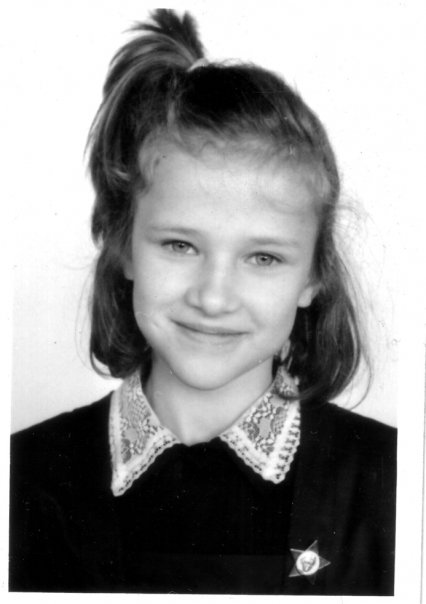Generation of early 1980s witnessed the wind of change at its best (or worst?). Such an extreme shift in the country’s politics and economy left a deep mark on those born in the still-USSR. The agony of USSR coincided with the most innocent and careless period of our lives – childhood.
In the 80s Lenin was everywhere – the main streets were named after him, his full-face and profile portraits were everywhere and so were red sickle-n-hammer flags with yellow fringe. We knew the lyrics and the legends about him by heart; this kind-looking man in a cap was smiling to kids from so many book pages. “Granddad Lenin likes clean plates!” – our nannies used to tell us instructively. “Study, study and study! (V.I.Lenin)” preached the posters on the class wall. His authority could not be questioned. International worker’s day was always fun – sitting on pony’s back and holding little red flags flickering on fresh May’s breeze.
In 1991, already after the army dudes failed to hold the power yet before the official death of USSR, me and my classmates were honoured a title “octyabryonok” – the youngest grade of Soviet youth which then would have promoted to “pioneer” and “komsomoletz”. The brown school uniform with the red star badge attached to the top became our second skin for 4 years, despite all the changes happening in the country.

Suddenly they told us “we lied to you about Lenin. He was a mean man with malicious intentions, and the miseries we are facing are entirely his fault”. The problems at that time were not a joke: a total deficit of all types of goods, rapid inflation and insecurity. In 1992-1993 prices were growing every day, making it 10-30 times higher at the end of the year in comparison with the beginning. This rapid inflation flushed away all the savings of 90% of population which meant utter poverty. The savings my family had, before 1992 were enough for a two bedroom apartment and a car, in 1993 same amount was worth only a fridge, in 1995 – a few loaves of bread. I remember going to buy bread, standing in a queue for an hour, and every day it would become more and more expensive. If in January 1992 bread coasted 1 ruble then in a year the price was already 24 rubles. The worst thing was the endless queues for anything and food tickets. Food available was crap – liver sausages that I will hate for the rest of my life and Italian spaghetti of the lowest quality (maybe, that’s why I dislike pasta so much). For a child like me, queues were annoying but bearable – I played with other children in a queue, right in a store or outside. Queuing in winters and summer was a tough experience, queues often did not fit in a store and a long tail of it stayed outside, struggling with freezing snowstorms or melting under scorching sun. Often a few hours of waiting used to end up in nothing – food supplies could finish just before your turn. Especially often it happened when my grandfather was sent for a food mission. He was such a gentleman that could not resist offering his turn to every lady with a child (of course, my grandma did not adore this habit). And the worst was yet to come…
Wild 90s gave us another surprise – in 1994 governmental employees stopped receiving their monthly pay. Sometimes salaries were 5-6 or even more months overdue. Grandparents’ pensions saved us from starving. Their veteran status was beneficial too – from time to time we could buy delicacies from a special store for veterans.
Security was going down as fast as prices were going up. The blast of crimes shocked everyone, it was no longer safe to leave a child playing outside. Sounds of shots became a common thing. If you do not believe how bad it was, I can tell you my two school mates, one 15 and the other one 16, were murdered for SEGA game and a video player.
Whist majority was struggling for survival, the small group of enterprising people was multiplying they yeast-like growing wealth. We witnessed a huge mentality shift and changes of values. Whatever was good for USSR became a taboo in the newborn Russian Federation, and the opposite. Thus, money became everything and could justify anything, including the way they were earned. “Losers” learned the new truth “The rich is always right”.
However, do not think everything was bad in the 90s. Yes, we did not have enough food and not always it was delicious. Yes, some of us did not have nice clothes to wear (whereas others had plenty of them). But there was some great rock music; bands like Kino, Nautilus and DDT (highly recommended) fuelled our hearts with passion. Music helped us to pass though the hard time and save our sanity. For worse or for better, we always be the last generation born in USSR who witnessed the historical change, and who learnt two very important lessons: first – with an empty stomach, freedom seems incomplete and not so desired and second – truth is never a constant, it is a variable.

Very interesting and fascinating!
Thank you!